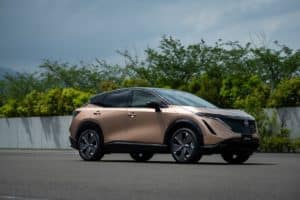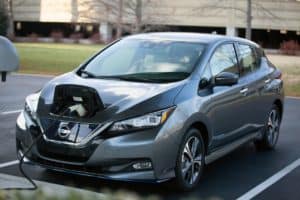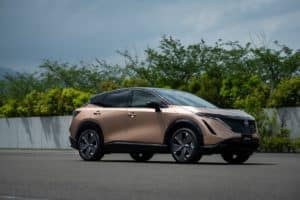
When Nissan launched the LEAF in 2010, it changed the car industry indefinitely. The Nissan LEAF was the world’s first all-electric mass-market vehicle, and today, it is also the most affordable electric vehicle (EV). Now, one decade later, Nissan continues to pioneer the industry in an eco-friendly direction with their EV36Zero flagship. This strategy aims to create the first-ever EV manufacturing ecosystem and push towards a cleaner, more sustainable society for all.
As the market turns towards hybrids and electric vehicles, more drivers are making the shift to go electric. For those looking to make the change, here’s what you’ll need to know on how EVs work, their costs, benefits, and more.
How do electric vehicles work?
As the name implies, all-electric vehicles use electricity as their fuel source instead of gasoline. These vehicles are equipped with an electric motor and battery pack rather than a traditional internal combustion engine and gasoline tank. Because of this, EVs emit zero tailpipe emissions and have fewer moving parts.
Instead of fueling at a gas station, EVs must be charged either using a wall outlet or public charging station. All-electric cars come with a standard charging cable, meaning it can be done even from the comfort of your home. If you’re traveling a far distance, there are over 42,000 public charging stations. Even more so, the current administration hopes to expand this to over 500,000 charging stations nationwide by 2030. Most EVs can drive 150 to 250 miles in one single charge.
Unlike EVs, plug-in hybrid vehicles (PHEV) use both gasoline and electricity. Since they are a combination of the two, they are equipped with a battery, electric motor, gasoline tank, and internal combustion engine. Additionally, they can be either charged or fueled at a gas station.
PHEVs work by operating exclusively on electricity until the battery is empty. After that, the vehicle will switch to gasoline. PHEVs on average have an all-electric range of about 30 miles. Hybrids, on the other hand, have zero all-electric driving range. They work by using an electric motor to assist the gas-powered engine. Because all the energy comes from gasoline, they cannot be plugged into to charge.

How do I charge my EV?
One of the biggest benefits of owning an electric car is the convenience. Charging can be done either at home or at public charging stations. There are 3 types of charging, which are categorized by how fast they work. The first is Level 1, which is the slowest method. On average, this adds about 5 miles of driving range per hour. For drivers who charge overnight and commute about 50 miles per day, this is sufficient. Level 1 charging can be done with a dedicated 120 V outlet, which is the most standard type.
The next is Level 2, which is much faster but requires installing a charging station. These require a dedicated 240 V electrical circuit, which most garages include. Depending on the battery type, Level 2 adds about 15 to 35 miles of driving range per hour. Another perk with owning an EV is that most states offer rebates, including installing home charging stations. The cost of this will vary depending on the home’s configuration but typically ranges from $500 to $2000 with labor and materials.
The last charging type is DC fast charging. DC requires a 480 V connection, meaning it’s unsuitable for home use. Additionally, not every EV is capable of this type of charging. Fortunately, it is available on the Nissan LEAF Plus and Nissan Ariya. Even better, Nissan has partnered with Amazon to make buying and installing a charging station just clicks away. DC charging stations can be found in shopping centers or along major travel routes, and they add up to 10 miles of driving range per minute.
How much does it cost to charge an EV?
While electricity costs vary on location, California’s current average residential electricity costs about 17 cents per kilowatt-hour (kWh). At this price, charging the Nissan LEAF with a 40-kWh battery (150 miles) would cost about $7 for a full charge. On the other hand, fueling a 25-mpg vehicle for the same mileage would cost about $26. That’s nearly 4x the cost of an EV! You can use Nissan’s calculator to receive an accurate estimate on yearly savings, including incentives and tax rebates. On average, EV drivers save over $10k in gas alone.
When you’re away from home, charging costs can vary. Some places offer free charging, while others require payment per hour. Typically this is about $2-$3 per hour of charge time. You can use websites like PlugShare to find locations near you.
What are the benefits of owning an EV?
There are many benefits to going electric. Most people are drawn to the zero tailpipe emissions, but that’s just the beginning. When you purchase a gas-powered vehicle, the cost of owning it isn’t just what you pay upfront. It’s also the fuel, maintenance, and occasional repair work. With EVs, you pay less for charging and the fewer moving parts mean little to no regular maintenance needed. When you go electric, you can say goodbye to oil changes and gas stations forever. Along with this, when you do need repair work, it’s typically less expensive than traditional gas vehicles. Even parts like brakes require less maintenance due to regenerative braking.
It doesn’t stop there. There are also federal and state tax incentives on electric vehicles. Nissan also recently slashed the price of LEAF’s, making it the most affordable EV on the market. Along with this, EVs are quieter than diesel vehicles meaning there’s less noise pollution and a more comfortable cabin experience.
Lastly, one of the biggest reasons to go electric is that electricity is a renewable resource. EVs have a significantly smaller carbon footprint over their lifetime and help create a cleaner, more sustainable environment.
What kind of EVs does Nissan offer?
Nissan offers two all-electric vehicles; the Nissan LEAF and all-new 2022 Nissan Ariya, which will go on sale in early 2022. The Leaf is equipped with a 40 kWh lithium-ion battery and has an EPA range of 150 miles. The LEAF Plus models are equipped with a 62 kWh lithium-ion battery and have a range of up to 226 miles. The five-passenger hatchback offers generous technology features, a sleek interior, and budget-friendly pricing.
For those needing something bigger, the Ariya is a spacious all-electric SUV. The Ariya is estimated to have about 300 miles of driving range per charge when equipped with the 87 kWh battery.
Have any questions? We’re happy to help. Contact us online or by phone. You can also stay up-to-date on the latest Nissan news by following us on Facebook and Instagram.



